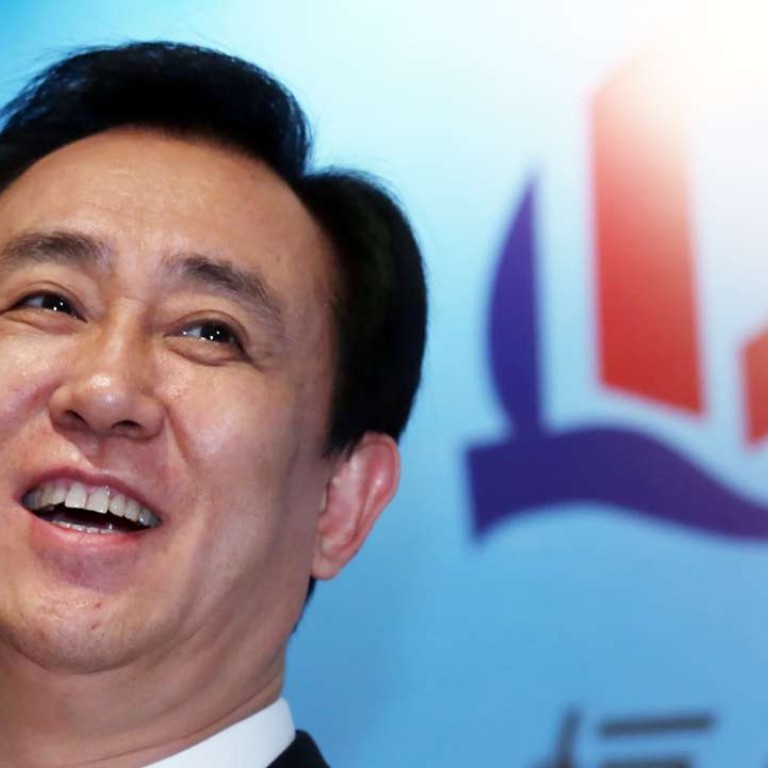
Analysis | Evergrande’s Hengda Real Estate deal unveils close links with Shenzhen government
The recent eye-catching deal opens small window into some of the Evergrande chairman’s mysterious circle of friends and highly influential connections
Few people seem to have figured out how Hui Ka-yan and his heavily indebted property leviathan China Evergrande Group always seems to able to secure financial support.
But a recent eye-catching deal has opened a small window into some of the 58-year-old tycoon’s mysterious circle of friends and highly influential connections.
This month, Evergrande has introduced eight strategic investors who will contribute a combined 30 billion yuan, for a combined 13.16 per cent of the enlarged equity interest in Hengda Real Estate, the group’s flagship property arm, which is seeking a backdoor listing in Shenzhen.
The transaction values Evergrande’s core real estate business at 228 billion yuan, more than four times its current valuation in Hong Kong, where it’s also listed.
Among the eight investors are long-term vendors and partners of the developer, including Citic Juheng Investment Holdings, a subsidiary of state-owned Citic Trust – Evergrande’s strategic financing partner, and Guangtian Investment, a unit of Shenzhen Grandland Group, which has been which has been designing and building interior decorations for Evergrande for a decade.
Some of the eight hardly ever get noticed, but actually have strong government backgrounds.
Little-known Shenzhen Meitou Hi-tech Venture Capital investment, for instance, which spent 3 billion yuan and now holds 1.32 per cent of Hengda Real Estate, is actually controlled by Shenzhen Pantide Information Technology, which runs cninfo.com – one of the few officially assigned legal platforms for listed company information disclosure in China.
Pantide Information itself is an affiliate of the Shenzhen Stock Exchange, which is founded by the Shenzhen government.
Shenzhen Huajian Holdings, meanwhile, which controls 2.19 per cent of Hengda Real Estate after pouring 5 billion yuan into it, is a subsidiary of Shenzhen-based developer Huachao Holdings, formally known as Guoxiang Holdings.
Evergrande’s wealthy resource of redevelopment projects in Shenzhen shows its tight connection with the Shenzhen government
A somewhat mysterious operation, Guoxiang Holdings is a firm with rich urban redevelopment project resources in Shenzhen, which are usually granted by the city’s government.
Redevelopment projects are regarded as the most-valuable assets in Shenzhen, the country’s third largest city, where there is a serious shortage of land.
It is very rare for non-local developers to access to those state land reserves, but Guangzhou-headquartered Evergrande manages to.
It bought a controlling stake in Guoxiang Real Estate in 2013, and gained all of its redevelopment projects, which alone would support Evergrande’s continuous development in Shenzhen for 15 years.
“Hui’s face is a regular on the state broadcaster Central China Television news, which makes it look like the government gives him big support,” says Carol Wu, China property analyst at DBS Vickers.
“Evergrande’s wealthy resource of redevelopment projects in Shenzhen is a demonstration of its tight connection with the Shenzhen government,” she said.

The property giant has been aggressively expanding its footprint in Shenzhen in recent years, mostly by accessing prime urban renewal projects, including the latest Wanxia project in the city’s most-expensive residential district, Nanshan.
Last month, chairman Hui unveiled it has secured 32 housing projects in total in Shenzhen, with a total stock worth up to 600 billion yuan.
Evergrande declined to comment to South China Morning Post’s questions about its connections with the Shenzhen government.
Founded in 1996, Hui’s Evergrande overtook China Vanke to become the country’s biggest homebuilder at the end of last year, its 20th anniversary, after full-year sales reached record 373.3 billion yuan.
Nevertheless, its debt level is also the highest among the biggest players, with net gearing ratio at around 430 per cent by the end of last June.
Feeling its shares in Hong Kong seriously undervalued, Evergrande last year launched an ambitious plan to carry out a backdoor listing of its core property assets on the Shenzhen stock market.
Analysts say the introduction of “strategic investors” is a way to help Evergrande ease its debt burden, as well as push up its valuation.
“Hui has built a far-reaching network in Guangdong province, and many want to establish business relations with him,” said Alan Jin, a property analyst with Mizuho Securities.
And it is not a bad deal for investors, he said, given that Hui has promised to distribute at least 60 per cent of his real estate unit’s net profit to shareholders in each of the next three financial years, which are expected to bring a 6 to 7 per cent annual yield.

